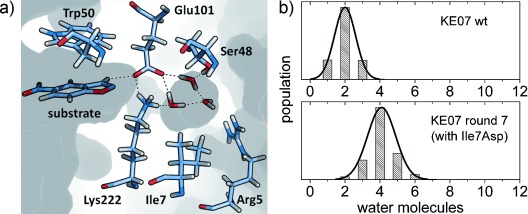Computational Enzyme Design Services
Welcome to our computational enzyme design services, where we offer a comprehensive range of solutions to accelerate the discovery and optimization of enzymes. Our expertise lies in harnessing computational tools, advanced algorithms, and bioinformatics techniques to drive enzyme design and engineering.
Overview of Computational Enzyme Design:
Computational Enzyme Design is a scientific field that utilizes computational methods, algorithms, and modeling techniques to design and engineer enzymes with specific properties and functionalities. It involves the application of computer-based tools and simulations to predict and optimize enzyme structures, binding interactions, catalytic activities, and other characteristics.
Our Services:
• Enzymes Bioinformatics Analysis:
Our team performs in-depth bioinformatics analysis of enzymes, leveraging databases, sequence analysis tools, and structural databases to gain insights into enzyme families, evolutionary relationships, and functional annotations. This analysis helps us understand enzyme properties and guides the design process
• Computational Modeling of Enzyme-Ligand Interactions:
We employ molecular modeling techniques, such as molecular docking and molecular dynamics simulations, to study the interactions between enzymes and ligands. By predicting the binding modes and affinity of ligands, we can design enzymes with improved substrate specificity and catalytic efficiency.
• Predicting Substrate Binding Pathways through Simulation:
Through molecular dynamics simulations and computational studies, we can predict the pathways of substrate binding and release in enzymes. This information allows us to optimize enzyme designs for efficient substrate recognition and binding kinetics.
• Using Bioinformatics Tools for Enzyme Active Site Prediction:
We utilize state-of-the-art bioinformatics tools and algorithms to predict enzyme active sites and identify key residues involved in catalysis. This information is crucial for designing or modifying enzyme active sites to enhance catalytic activity and selectivity.
• Integrating AI and Machine Learning in Enzyme Design:
We leverage the power of artificial intelligence (AI) and machine learning algorithms to analyze large datasets, identify enzyme structure-function relationships, and develop predictive models. This integration enables us to accelerate the enzyme design process and make data-driven decisions.
• Enzyme Docking Studies:
Our services include enzyme-ligand docking studies, where we computationally predict the binding modes and affinities of ligands to enzymes. This information aids in the rational design of enzymes with improved substrate specificity, affinity, and binding kinetics.
Why Choose Us?
• Accelerated Design Process:
With our computational approach, we significantly speed up the enzyme design process compared to traditional experimental methods. By leveraging advanced algorithms and modeling techniques, we can rapidly explore a wide range of enzyme designs, predict their properties, and prioritize the most promising candidates for experimental validation. This reduces the time and resources required for enzyme development.
• Precise Control over Enzyme Properties:
Our services provide precise control over the properties and functionalities of designed enzymes. Through computational modeling and simulation, we can tailor enzyme characteristics such as substrate specificity, catalytic activity, stability, and binding affinity. This level of customization allows us to engineer enzymes that precisely meet the specific requirements of our clients' applications.
• Cost-Efficiency:
Computational enzyme design offers a cost-effective alternative to traditional experimental approaches. By minimizing the need for laborious and expensive trial-and-error experiments, we save on material costs and reduce the overall development time. Our services optimize resources and provide a cost-efficient solution for enzyme design and optimization.
• Access to Advanced Computational Tools:
As a specialized company in Computational Enzyme Design, we have access to state-of-the-art computational tools, software, and databases specifically designed for enzyme analysis and design. Our expertise in utilizing these tools enables us to maximize the accuracy and efficiency of our designs, providing clients with cutting-edge solutions.
• Insights into Enzyme Mechanisms:
Through computational modeling, we gain valuable insights into the underlying mechanisms of enzyme function. We can analyze enzyme-ligand interactions, substrate binding pathways, and catalytic mechanisms at a molecular level. These insights not only guide the design process but also contribute to a deeper understanding of enzyme function and catalysis.
With a focus on accuracy, efficiency, and innovation, we strive to deliver enzyme designs that meet the highest standards of quality and performance. Our team of experts combines computational expertise, bioinformatics knowledge, and cutting-edge tools to drive advancements in enzyme design, enabling clients to unlock the full potential of enzymes for their applications. Contact us to get your exclusive services now.
Reference: Kiss, G.; et al. Computational Enzyme Design. Angewandte Chemie International Edition. 2013. 52(22): p. 5700-5725.
Fig. 1. The active site of the computer-based "wild-type" KE07 design. (Kiss, G.; et al. 2013)

